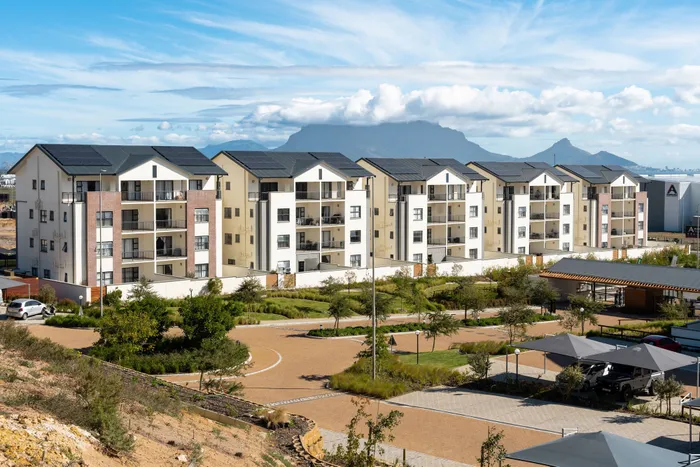Balwin Properties reports 33% profit increase amid market recovery
Property development

Balwin Properties’ De Aan Zicht Estate in Cape Town. The developer of quality apartments has reported stronger investor and homebuying appetite in the South African market in the six months to August 31.
Image: Supplied
Balwin Properties' profit increased by a robust 33% to R102.4 million in the six months to August 31 after improved sentiment in the investor and homebuying market, the directors of the JSE-listed large-scale sectional title residential estates developer said on Tuesday.
Revenue was up 44% to R1.2 billion. Headline earnings a share increased 29% to 20.91 cents. The number of apartments sold and recognised in revenue increased year-on-year to 928 from 640 that were recognised in revenue in the first six months of the prior financial year.
There was also a recovery in pre-sold apartments not recognised in revenue to 1 028, from 743 in the first half of the financial year. Balwin Annuity added a strong bottom line contribution, after it increased revenue by 55% to R101.5m, mainly from electronic communication and internet services revenue streams, as well as maintenance services and energy and solar bond origination
.
“Our performance for the first six months of the financial year is very encouraging, supported by a lower interest rate cycle, enhanced loan affordability and improved sentiment from investors and homebuyers in the residential market. It should be seen in the context of the tough 2025 financial year, though, and comes off a low base,” said the CEO Steve Brookes.
He said even though the market was more buoyant, they continue to focus on managing construction costs and reducing operating expenses wherever possible and they would continue to be supported by Balwin Annuity’s strong performance.
Brookes said the higher number of apartments sold was mostly as a result of strong buyers’ interest following the moderation of inflationary pressures and a cautious easing of interest rates of 50 basis points over the period by the Reserve Bank.
Balwin’s performance was underpinned by several measures aligned to market recovery, including, accelerating construction to match sales velocity while preserving cash flows, cost engineering to manage construction costs without compromising quality, and reducing reliance on sales incentives due to stronger market conditions.
Other measures included leveraging sport as a brand marketing tool and tightening overheads and reducing operating expenditure wherever practical.
Operating costs increased by 24% to R193.1m, reflective of the increased number of apartments handed over and the expansion of Balwin Annuity’s footprint. Fixed costs within the group reduced marginally.
The gross profit margin eased slightly to 29%, down from 32% in the previous interim period, which included a R46m land sale in Tshwane East for shopping-centre development.
Brookes said while no land sales occurred during the period, they remain committed to selling land parcels at large-scale developments to partners offering complementary amenities, such as retirement developments, schools, fuel stations and retail facilities.
The Western Cape reclaimed its position as the group’s leading revenue contributor, accounting for 51% of total revenue, underpinned by a robust 70% year-on-year growth in the region. Gauteng followed closely, contributing 40% of revenue and delivering a solid 22% improvement.
KwaZulu-Natal, while contributing a smaller share at 9%, recorded significant growth off a lower base, reinforcing the province’s growing relevance in the group’s national footprint.
Brookes said Gauteng’s development pipeline remains particularly strong, with about 24 000 apartments under the build-for-sale model, largely concentrated within the Mooikloof Smart City, a government-designated Strategic Integrated Project.
In the Western Cape, a pipeline of 4 400 apartments was under active review to meet sustained demand. Management was exploring additional zoned and serviced land opportunities.
In the annuity income segment, rental income rose by 53%, and now represented 23% of annuity revenue. This growth was driven mainly by The Eastlake in Johannesburg East - Balwin’s first bespoke rental development - which outperformed expectations with average occupation at 97.4%.
Additional annuity streams, including maintenance services, digital advertising, cellular towers, and padel facilities, contributed R15.6m. Solar energy and bond origination services grew by about 60% to R18.7m.
“We’re cautiously optimistic about the second half of the financial year, provided that the operating environment remains stable,” said Brookes.
BUSINESS REPORT